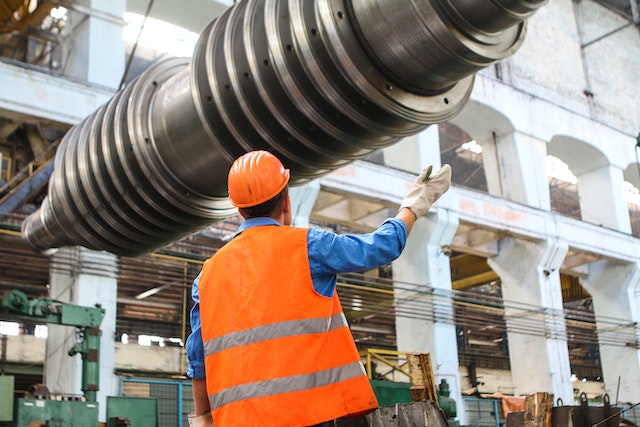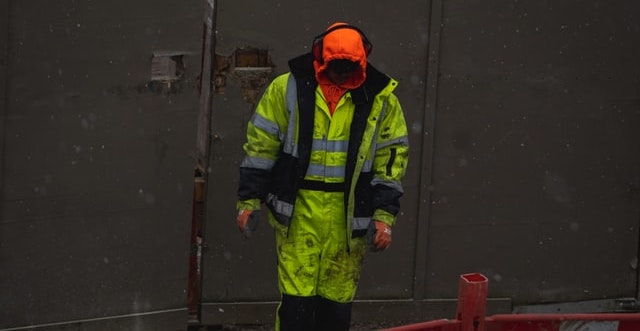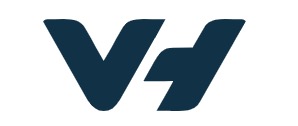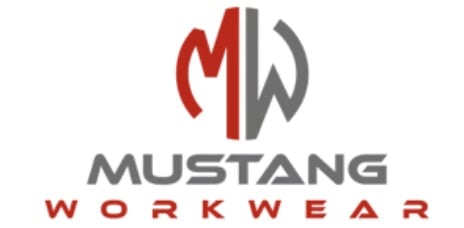By: Behnam Ghasemi :: Kohan Textile Journal
As the name implies, workwear clothing is created and manufactured for employees, operators, and executives of businesses, organizations, offices, etc., who work primarily in the operative sector. Since they are frequently made from materials with high resilience and strength, they are susceptible to harm, such as tearing, burning, and other forms of damage.
The following are some of the most crucial factors that should be taken into account while designing and manufacturing work clothes:
1- Upholding Safety and Health:
The most crucial and primary function of work attire is to maintain the health and safety of employees and corporate agents. According to the nature of the work and the industry in which it is worn, it should contain the essential parts to support this goal. For instance, a worker who is in fire exposure should wear clothing that is fire resistant, and employees in a hospital’s operating room or a food processing facility should dress appropriately for their jobs.
Employees who work in areas where corrosive and dangerous substances are present should wear clothing that is an appropriate insulator against liquid, gas, chemicals, etc.
Using chain watches or keys while operating industrial equipment is not advisable, and workers with industrial machinery must wear uniform, undamaged clothing.
Hats, gloves, and safety shoes are also required for firefighters and other professionals who work around heat and fire. These items must also be produced of fire-resistant materials. Heat-protective clothing is worn when working close to furnaces and thermal operations. It is created of special aluminium-coated fibers that reflect up to 90% of infrared rays.
Wearing workwear with pockets, edges, or a lot of creases is not recommended for people operating in environments with dust, flammable substances, or explosions. Because these poisonous compounds may persist in clothing folds or pockets and ultimately result in poisoning.
Employees handling radioactive, chemical, and acidic chemicals must wear impermeable safety gloves, waterproof caps, and uniform clothing free of perforations.
It is vital to wear clothing with short sleeves if the nature of the work requires employees to roll up their sleeves frequently.
Workers who operate in areas where explosions are likely shouldn’t wear clothing with a high chance of igniting or shouldn’t wear glasses or solenoids either.
In chilly climates or during the winter, clothing should be lined with wool, and in wet environments, hats should be worn while dressing.
2- Lightness and Ease of Use:
Work attire should make the wearer feel pleasant and at ease while doing its intended purpose. For instance, a worker who spends the entire day performing services and repairs on the streets should feel comfortable in looser, lighter clothing. The more at ease a person feels in his work clothing and the better he feels overall, the more productive and efficient he will be.
3- Clothing Durability:
Work attire needs to be robust and shouldn’t be worn too frequently. Utilizing tear- and damage-resistant materials can extend the use and lower expenses.
4- Night Visibility and High Visibility Clothing:
Some professionals have to work at night, particularly on the roads. Thus they need to wear clothing that can be seen by cars to avoid accidents and injuries. In this situation, night vision gear is appropriate.
These suits are necessary for people who operate cranes and forklifts, work on the sides of the road and in pipelines, and respond to emergencies.
5- Lowering the Expense of Maintenance and Laundering:
Businesses that purchase work attire for their staff typically prefer the clothing to be long-lasting and not be worn out too quickly. Additionally, the dress should be simple to fix and restore. Manufacturers of work attire ought to include this feature in the apparel.
6-Maintaining brand individuality and styling:
Although the primary purpose of work attire is to safeguard the safety and health of the wearer, this does not excuse disregard for the clothing’s aesthetic appeal. First and foremost, the purchasing firm wants to use a lovely outfit to showcase its brand characteristics. Second, the employee enjoys wearing fashionable and distinctive work attire. Therefore, it is vital to ensure the brand’s personality and workers’ dignity through apparel design.
Since women are more concerned about appearance and clothes design than men, this issue is significantly more significant when designing women’s workwear.
Women can choose attire that fits their figure while being functional and pleasant so that they are not restricted while working. The idea is provided by an essential manufacturer of work uniforms in the USA that offers two models and two different cuts for each size based on their waist and hip sizes.
In a sense, it can be claimed that the stability and trustworthiness of the company are demonstrated by how intricate, attractive, and compelling the work attire are. Consider this carefully if you’re looking for workwear for your organization’s or company’s personnel.
People should consider what they wear at work to avoid sending conflicting messages to their coworkers and customers. Work clothes, like regular clothes, send out a message. People today feel more identified by their job attire and uniforms.
7- Weather Conditions Compatibility:
Employees work in various climates, temperatures, and humidity levels. Workwear manufacturers in North Africa should be aware that there are significant differences between selecting fabric type and weight, preparing the inside of the clothing and allowing air to circulate there, waterproofness, color, and other factors when designing and producing workwear for oil platforms in Dubai with extraordinarily humid and hot climates and municipal workers in London.
observing the production criteria for workwear
You probably already know that the European market is the primary export destination for North African companies that produce workwear. In actuality, many producers monopolistically create their goods using imported high-quality raw materials and European standards. However, it’s crucial for North African workwear producers who work independently and under their brands to adhere to the rigid European criteria for importing this kind of goods. Work attire must conform to their requirements because they are directly tied to employees’ health.
What Materials Are Used to Produce Work Clothes?
Nylon – Polyamid: The unique qualities and traits of nylon fibers, threads, and of course, nylon textiles have produced the best and most resilient work attire. Because of its excellent tensile strength and abrasion resistance, nylon can withstand extreme weather conditions and last a very long. Nylon is easily recyclable and can be added back into the production process. Work attire made from nylon and polyamide threads, which serve as their primary representatives, are more expensive than other things.
Polyester: An oil-based textile with a recent surge in popularity, polyester has demonstrated its versatility across several industries. Polyester clothing can improve the body’s ability to breathe combined with cotton or wool. Polyester has excellent abrasion resistance.
Natural fibers: Although natural fibers are undoubtedly beneficial to the body and more breathable than synthetic fibers, they are often insufficient to provide adequate worker protection. Natural fibers are mixed with synthetic fibers in varying ratios to achieve the desired properties. After weaving, they are treated with special protective coatings during the finishing or coating process.
high-performing textiles
Developing fibers and threads with extremely high performance and capacities due to advancements in the textile industry and fiber research might be crucial in creating specialized work clothes. For instance, the problem of static electricity on the operators’ clothing in susceptible locations can be disastrous. Today, we may create anti-static clothing by making conductive threads.
Anti-cut threads can also be utilized in creating gloves, pants, and other clothing in the metal industry and in different settings where workers handle sharp items.
Indeed, the market for work attire is broad and growing in several sectors. It is crucial and one of the needs of employers, particularly in European, American, and Canadian countries. As a result, North African producers of workwear can always count on worldwide innovation and improvements in this industry to maintain control over these important markets.
Tunisia is a North African country that does well with its exports to Europe. For instance, 95% of Tunisia’s exports in the workwear industry go to just six nations: France, Italy, Germany, Belgium, the Netherlands, and Spain.
The Best workwear Manufacturers in North Africa:
Mezrahikonfektion
Contact Info:
Address: Sidi Rezig, Tūnis, Tunisia
Tel: +216 23 209 623
Malta office: Industry Ltd Triq San Giljan , B’Kara Malta BKR 2808
Tel: +216 23 209 623 / +216 26 787 911
email: [email protected]
About: We are the leader of confection workwear in Tunisia. We are the company of professional sewing team and flexible services in the field of protective clothing and military garments. We are Mezrahi confection which lead its customers orders through its factory big manufacturer of workwear depending on 5 chains and 350 labore as well as technicians full of experience and sewing solutions.
We Have More Than 25+ Years of Practical Experience
Technicians team are with 25 years of experience lead more than 350 labors. our labours are polyvalent and professional and Our challenge is the quality, flexibility and competitive prices
Vanheurck workwear
Contact Info:
Tel: +32 3 321 21 05
Email: [email protected]
About: Our Tunisian plants are managed from our offices in Belgium. Close cooperation with Tunisia and weekly transports ensure a smoothly running production process resulting in deliveries within the agreed timeframe.
VH N.V, a textile manufacturer founded in 1920, has been known for its quality and flexibility. Our goal and challenge is to keep our customers satisfied and to translate their wishes into high-grade professional garments. By using modern technologies and the highest quality materials, constant quality is always guaranteed.
Our sales team remains available to discuss your plans and tendencies in the market in order to convert your ideas in tailor-made developments. At your request, we create high-quality image garments. For personalizing your garments, we are your right partner, taking care of your logos (embroideries, transfers, prints, etc.).
Quality and service are our main assets and as such play a vital part in ensuring today’s success.
Maco-confection
Contact Info:
Address : Boulevard de l’environnement 5042 Mesjed Aïssa Monastir-Tunisie.
Phone: (+216) 73 42 23 88 / (+216) 73 42 23 90
E-mail : [email protected]
About: The company MesjedAissa Confection “MACO” was created in 1990 and located at the Boulevard de l’environnement 5042 MesjedAissa in the governorate of Monastir with a registered capital of 250,000 Dinars distributed at the rate of 70% Belgian and 30% Tunisian.
The company MACO works in the field of the manufacture of technical articles and the production of professional work clothes and images 100% destined for export for all of Europe and with customers of international renown such as:
SAMSONITE: domestic manufacture of suitcases American company located in Belgium, world leader in baguagerie
HAVEP: Dutch customer in professional workwear
ITC: ALFREDO GRASSI Group Italian customer in workwear
SINUTEX: group BETANCOURT French customer in the workwear
MANUTTI: Belgian customer specializing in the manufacture of covers for outdoor salons with ultrasonic welding
GERACI: French customer in work clothes for DIY stores: BRICOT DEPOT in Europe
PROTECOP: French customer in the manufacture of protective articles for police
IS3: Belgian customer in workwear images and covers for automotive paint robots
Garaconfection
Contact Info:
Address: Habib Thameur Road, 5121 – Rajiche Mahdia- Tunisia
Phone: +216 73 687 774
E-mail: [email protected]
About: Founded in 1986 by Mr Mohamed Gara, “Gara Confection Group” specialized in the manufacture of military clothing and workwear. the group’s structure was strengthened in 2003 by Mr. Chekib Gara (master’s degree in international trade at the European institute of advanced international studies) and in 2008 by Mr. Naoufel Gara (textile engineer at the “Niederrhein” graduate school in mönchengladbach en Germany)…
Contact Info:
Address: Zone Industrielle Ben M’Sick Lot 90, Sidi Othmane, Casablanca, Morocco
Email: [email protected]
Phone: +212 5 22 72 64 66
About: Mustang Workwear has more than 28 years of experience manufacturing workwear adapted to the needs of many sectors of activity such as industry, construction, craftsmen, etc.
We work closely with our customers in product development, our solutions are tailored to the requirements of everyday work wearers.
Our products are designed and developed in our factory based in Morocco. More than ten permanent specialists work in our product development and design department on your request.
8 Production lines, 4 workshops, and more than 400 highly qualified seamstresses ensure our high-quality standards and enable us to quickly ship special orders to our customers.
Mustang Workwear is a partner of many European companies. Our engagement has permitted us to build a relationship of trust with customers in France, Belgium, Germany, and the United Kingdom…
TM Fashion Factory and Hotel Supplies
Contact info:
Address: King Faisal St., El Kom EL Akhdar Station, End of Aly Shiha St, Haram, Giza, Egypt
Email: [email protected]
Marketing Mob: +2 01068813000
Saudi Arabia
Address: Southern Industrial Zone – El Khomra Jeddah – KSA
Email: [email protected]
Mobile: +966 540013531
About: TM Fashion Factory & Hotel Supplies is one of the leading Hospitality Uniforms and Linen manufacturers in the Middle East.
Since 1984, We are experts in uniforms and linen, supporting our business partners with the best fabrics to cover all the requirements and needs of the hospitality industry of Uniforms, Bedding, Towels, and Tablecloths.
We provide a wide variety of uniforms such as Hotel, Restaurant, Medical, School, Industrial, Corporate, Spa, Security, and Safety uniforms. and produce a great variety of T-shirts.
In addition to uniforms, we manufacture the widest range of bed linen out of premium Egyptian cotton starting from 144 TC up to 1000 TC either Plain, Stripe, or Jacquard, with/or any required special designs.
For years we provide state-to-the-art services and products to all our strong and global business networks in USA, Italy, United Kingdom, Germany, Spain, Belgium, Morocco, Libya, Sudan, Tunisia, Uganda, Kenya, Guinea, Turkey, Jordan, as well GCC.
Today, (TM Uniform & Linen) is the trendsetting brand of fine linen and workwear to hospitality partners and destinations around the globe.
If you have a Workwear Manufacturer you can add your company in the comment box below …






























